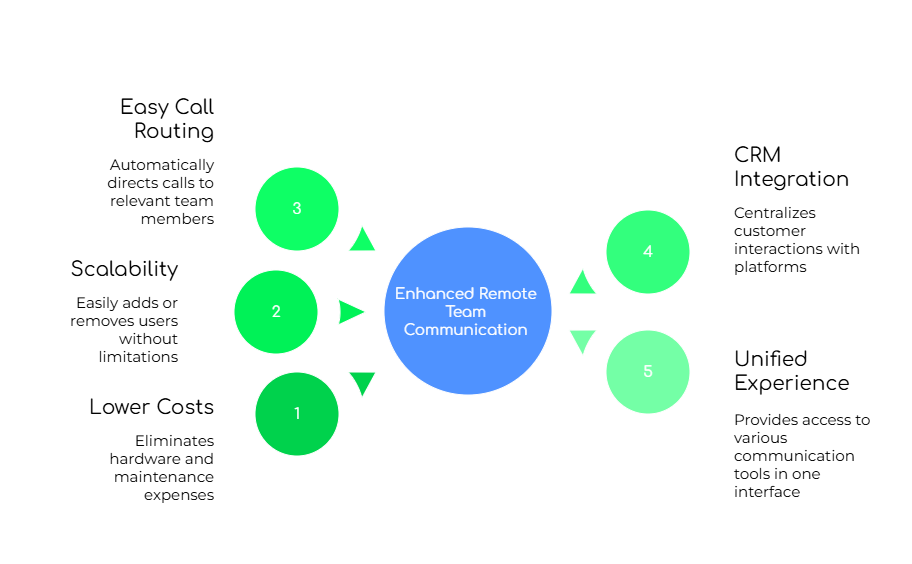How can small and medium-sized businesses in Thailand succeed in a world that thrives on remote connectivity? With the evolution of work culture across Asia, this question has become more relevant than ever, especially for companies aiming to stay agile, resilient, and competitive in a fast-paced digital landscape. In Thailand, the rise of remote and hybrid work environments has prompted businesses to rethink traditional communication systems. They’re now shifting from rigid and costly hardware to cloud-based solutions offering flexibility and instant scalability. Softphones for Remote Teams have emerged as essential tools, not just enabling voice calls anywhere, anytime, but also enriching communication with features like call analytics, CRM integration, and real-time monitoring.
This shift enhances internal collaboration, streamlines customer interactions, and empowers SMBs to grow without being constrained by physical infrastructure. Thailand’s investment in digital infrastructure, as highlighted by the U.S. Department of Commerce, demonstrates national support for remote work and cloud technologies. In this context, adopting Softphones for Remote Teams is more than a strategic advantage; it’s a requirement for long-term success. These platforms enable distributed teams, support mobile workforces, and elevate customer service standards. As the world grows more digitally connected, Thai SMBs equipped with the right communication tools will lead the way.
Table of contents
Why Remote Communication Matters for Thai SMBs?
Thailand’s business sector has witnessed remarkable digital transformation, especially among small and medium-sized businesses (SMBs) looking to stay competitive in a global economy. As remote and hybrid work becomes more common, there is an increasing demand for communication tools that are not only flexible but also cost-effective and scalable. Traditional phone systems, which rely heavily on fixed infrastructure and physical hardware, are unable to support these evolving business models. This has paved the way for Softphones for Remote Teams to become a preferred choice, offering cloud-based, mobile-first communication that empowers Thai SMBs to connect, collaborate, and grow seamlessly across geographic boundaries.

The benefits go far beyond just remote calling. Softphones provide a unified communication platform that brings together voice, video, voicemail, and messaging under one roof, accessible from any internet-enabled device. Whether employees are based in Bangkok’s commercial districts or operating remotely from Chiang Mai or Phuket, these tools ensure everyone remains aligned with the company’s objectives. FreJun enhances these benefits by offering an all-in-one communication solution that’s tailored for modern teams. Teams can respond to clients faster, access shared communication logs, and integrate their calling system with CRMs or helpdesks. In doing so, Softphones for Remote Teams bridge the gap between location-based limitations and modern, dynamic business needs, fostering efficiency and stronger organizational cohesion.
Challenges of Remote Work in Thailand
Despite rapid digital growth, many Thai SMBs still struggle with the practical challenges of managing a distributed workforce. Issues such as inconsistent internet connectivity in rural areas, varying levels of digital literacy among staff, and communication breakdowns due to language barriers are common. Without centralized, easy-to-use platforms, remote collaboration becomes disjointed, leading to delays, miscommunication, and reduced productivity. For businesses aiming to maintain high service quality while operating remotely, these gaps can become significant roadblocks.

Softphones for Remote Teams directly address these concerns by offering a reliable and unified communication experience. With cloud-based infrastructure, calls can be optimized even in areas with moderate connectivity, ensuring voice clarity and consistent service. Many softphone platforms also support multilingual interfaces and integrations with CRMs and helpdesk tools, which streamlines communication for both staff and clients. Customer-facing teams, especially those managing international clientele, benefit from features like call transcripts, auto-translation, and quick access to customer history, ensuring conversations remain clear, efficient, and professional. This aligns closely with initiatives promoted by the Digital Economy Promotion Agency (DEPA) to enhance Thailand’s digital infrastructure and support modern business communication tools.
What Are Softphones and Why Do They Matter
A softphone is more than just a modern-day replacement for traditional telephony; it’s a strategic communication asset. By leveraging internet connectivity, it transforms devices like smartphones, tablets, and laptops into fully functional calling systems. There’s no need for physical phone lines or desk phones, making softphones incredibly flexible, cost-effective, and ideal for a mobile or hybrid workforce.
When it comes to Softphones for Remote Teams, the benefits are far-reaching:

- Lower Communication Costs: Businesses can eliminate hardware expenses, maintenance fees, and long-distance call charges.
- Enhanced Scalability: Teams can add or remove users without infrastructure limitations, making it perfect for growing organizations.
- Easy Call Routing: Incoming calls can be automatically directed to available or relevant team members based on predefined rules.
- CRM and Helpdesk Integration: Softphones easily integrate with platforms like Salesforce, Zoho, or Zendesk, centralizing customer interactions.
- Unified Communication Experience: Team members can access calls, messages, voicemails, and analytics in one intuitive interface.
FreJun strengthens these capabilities with a remote-first design philosophy. Unlike many generic softphone providers, FreJun offers a clean, user-friendly dashboard, advanced analytics to track team performance, and features like Click-to-Call and Real-Time Monitoring. This makes FreJun not just a tool but a communication strategy that empowers teams to perform their best, no matter where they’re located.
Key Features of FreJun for Thai Businesses
FreJun is purpose-built for SMBs managing remote teams. Here’s how it stands out with key features that enhance communication, productivity, and compliance:

- Click-to-Call Integration: FreJun allows users to initiate calls directly from popular CRMs such as Zoho and Salesforce. This eliminates the need to manually dial numbers, saving time and reducing errors while improving the overall efficiency of sales and support workflows.
- Voicemail Transcription: Voicemails are automatically transcribed into readable text, enabling faster response times and easier reference. Team members can scan messages quickly, prioritize tasks, and avoid missing important information, especially helpful for teams handling multiple clients or languages.
- Real-Time Call Monitoring: Managers and supervisors can listen to ongoing calls, provide live coaching through “whisper” mode, or join calls when necessary. This helps maintain quality standards, support new team members, and improve customer interactions without interrupting workflow.
- GDPR-Compliant Call Logs: FreJun securely records and stores call logs by data protection regulations. SMBs dealing with customer data can trust that their communications are encrypted, trackable, and audit-ready an essential for maintaining trust and meeting compliance standards.
- Cloud-Based Interface: FreJun is entirely cloud-based, allowing users to access the platform from any device, anywhere. Whether teams are working from Bangkok, rural provinces, or internationally, FreJun ensures uninterrupted access and full support for Softphones for Remote Teams.
These features enable Thai SMBs to manage distributed teams more effectively while delivering a consistent and professional communication experience across departments, regions, and customer touchpoints.
Setting Up FreJun Softphones Effectively
Implementing FreJun for Thai SMBs can be done in five easy steps to ensure smooth communication and fast results:

1. Define Roles and Responsibilities
Start by mapping out who does what. Define specific user roles such as admins, supervisors, sales agents, or customer service reps. This clarity helps in setting call permissions, routing preferences, and voicemail access. With FreJun, role-based access ensures that sensitive data is only visible to authorized users, helping maintain security and accountability.
2. Onboard Teams Quickly
FreJun offers an intuitive interface, but onboarding is still essential, especially for teams that are new to Softphones for Remote Teams. Conduct a short live walkthrough or share in-app tutorials to help team members understand key functions like making calls, checking voicemails, and logging data into CRMs. This fast-track training ensures minimal downtime and encourages faster adoption.
3. Monitor Metrics Early
Activate FreJun’s built-in analytics tools from the start. Track call volume, average response times, missed calls, and customer engagement. These early insights give you a benchmark for success and reveal which workflows are effective and which need improvement. According to the Thailand Board of Investment’s insights, data-driven strategies are vital for accelerating SME growth and enhancing competitiveness.
4. Integrate Existing Tools
Don’t treat FreJun as a standalone tool. Connect it with the apps your team already uses, like Google Calendar for scheduling, HubSpot for CRM data, and helpdesk platforms for customer support. These integrations create a unified workspace, save time on manual entry, and help teams provide more personalized service across platforms.
5. Revisit and Refine
After implementation, schedule monthly reviews to evaluate performance. Use FreJun’s dashboards to spot trends like peak call hours or top-performing agents, and use that data to optimize your team’s communication strategy. Regular refinement helps ensure your Softphones for Remote Teams investment continues to generate value over time.
This setup strategy ensures that Softphones for Remote Teams are implemented smoothly and yield immediate productivity gains.
Key Takeaways

In today’s fast-evolving digital landscape, Softphones for Remote Teams are more than just an alternative to traditional telephony; they are the backbone of successful remote collaboration. For Thai SMBs navigating hybrid work models and growing demands for real-time responsiveness, softphones offer unmatched flexibility and control. They remove the constraints of physical office infrastructure, enabling employees to make, receive, and manage calls from anywhere using any internet-connected device. Beyond voice communication, they unify workflows by integrating messaging, voicemails, and analytics all in a single, centralized platform.
FreJun builds on these advantages with a platform specifically optimized for remote teams and small businesses. It offers a seamless user experience, enabling Thai businesses to integrate tools like CRMs, calendars, and helpdesks without technical complexity. FreJun’s call monitoring and analytics features provide visibility into team performance, helping managers coach employees, ensure service quality, and stay compliant with regulations. For organizations looking to maintain professionalism, scale rapidly, and deliver consistent client experiences, FreJun transforms basic softphone usage into a complete communication strategy. In short, it’s not just about staying connected. This significantly enhances decision-making speed, customer satisfaction, and overall team agility.
Final Thoughts

For small and mid-sized businesses in Thailand aiming to thrive in a remote-first world, the adoption of Softphones for Remote Teams is no longer optional; it’s strategic. As operations become more decentralized and customer expectations continue to rise, companies need tools that are not just functional but transformational. FreJun fits this need perfectly by simplifying communication, improving team accountability, and helping businesses scale without added complexity.
FreJun isn’t just another softphone solution; it’s a communication partner built for long-term success. From advanced call routing and CRM integration to real-time analytics and multilingual support, FreJun empowers Thai SMBs to maintain consistent, professional communication across regions and roles. With an intuitive interface and enterprise-grade reliability, FreJun ensures your teams stay connected, your clients stay informed, and your business stays ahead. If you’re serious about building a future-ready communication strategy, FreJun is the platform to trust.
Further Reading – US VoIP Number Implementation for International Trade in Saudi Arabia
FAQs
FreJun provides a guided setup that helps teams switch from traditional phones to Softphones for Remote Teams with zero downtime and minimal effort.
FreJun equips teams with features like live call monitoring, smart routing, and analytics, ensuring consistent performance and better collaboration.
FreJun is built to handle variable internet speeds, delivering stable, clear voice quality even in areas with fluctuating bandwidth.
FreJun integrates smoothly with platforms like Zoho, HubSpot, and Salesforce, allowing teams to handle calls and customer data from a single interface.
FreJun uses encryption protocols and GDPR-compliant systems to keep call data secure, giving businesses peace of mind with every conversation.
